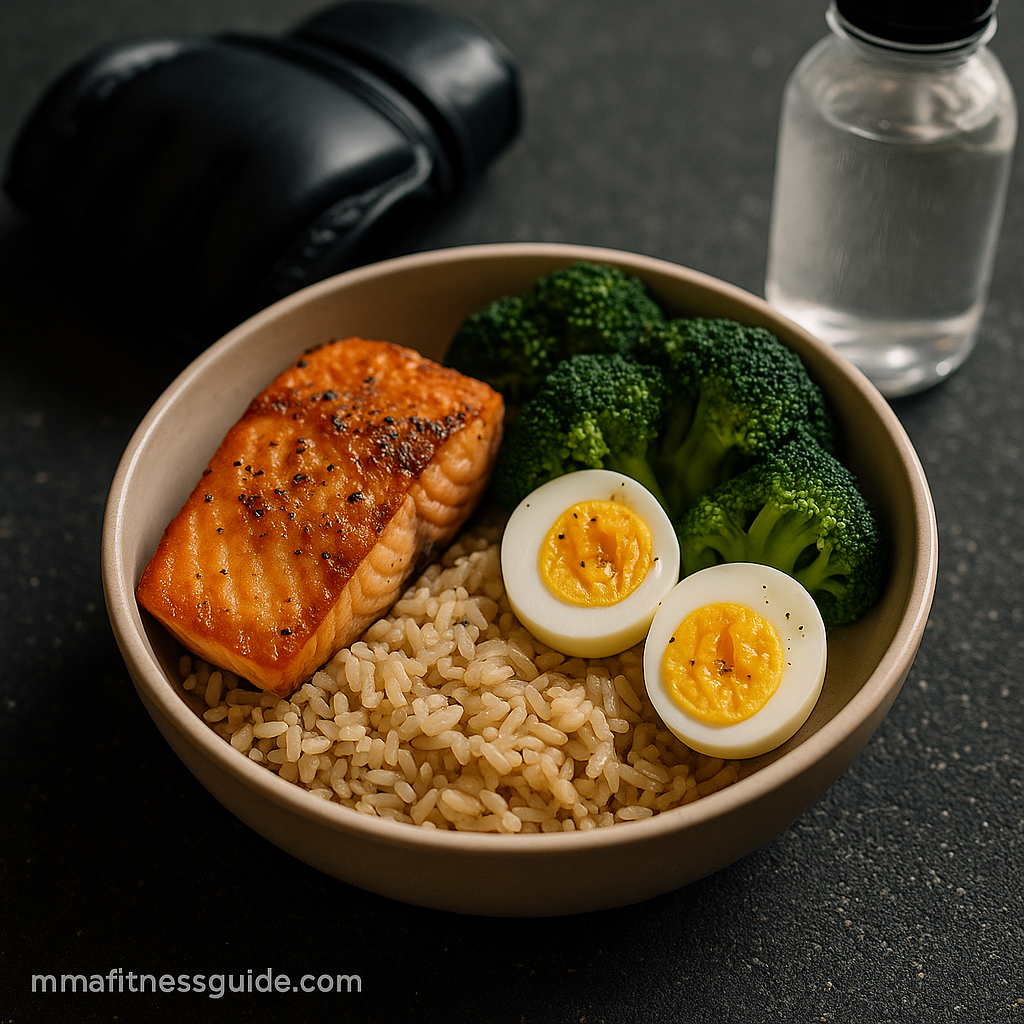
Refuel Like a Fighter
After an intense MMA training session — heavy sparring, grappling rounds, or conditioning drills — your body is running on empty.
Recovery isn’t just about rest; it’s about rebuilding your muscles, restoring energy, and reducing inflammation so you can perform again tomorrow.
Choosing the right recovery foods helps you bounce back faster, rebuild stronger, and stay consistent through demanding training schedules.
Why Post-Workout Nutrition Matters
During training, your muscles break down and your glycogen stores (your body’s main energy source) deplete.
If you don’t refuel properly, your recovery time increases and performance declines.
Your goal in the 30–60 minutes post-training window should be to:
- Replenish glycogen with healthy carbs
- Rebuild muscle tissue with protein
- Rehydrate and restore electrolytes
- Reduce inflammation naturally
The combination of nutrients you consume after training directly affects how well you recover and how quickly you improve.
1. Lean Proteins – Repair and Rebuild
Protein is the foundation of muscle recovery. It provides amino acids that repair microtears caused by training.
Top choices for fighters:
- Chicken breast – High-quality, lean, and versatile
- Salmon – Rich in omega-3s that reduce inflammation
- Eggs – Easily digestible, with essential amino acids and healthy fats
- Greek yogurt – Fast-digesting, with added probiotics for gut health
- Protein shakes – Convenient for the 30-minute post-training window
Pro tip: Aim for 20–30 grams of protein right after your session.
2. Complex Carbohydrates – Restore Energy
Carbs are your body’s fuel source — and after training, your glycogen tanks are empty.
Skipping carbs can lead to fatigue, poor recovery, and even overtraining symptoms.
Excellent carb sources:
- Brown rice or quinoa – Slow-release energy
- Sweet potatoes – Loaded with potassium and vitamin A
- Oats – Great for breakfast after morning sessions
- Whole-grain wraps or bread – Ideal for quick meals
Combine carbs with protein for optimal glycogen restoration — like grilled chicken with rice or eggs with oatmeal.
3. Fruits and Vegetables – Fight Inflammation
Heavy training causes oxidative stress and inflammation.
Colorful fruits and vegetables are packed with antioxidants, vitamins, and minerals that help your body heal naturally.
Best picks:
- Berries (blueberries, strawberries, raspberries) – Reduce muscle soreness
- Bananas – Restore potassium and prevent cramps
- Leafy greens (spinach, kale) – Anti-inflammatory and nutrient-dense
- Avocado – Healthy fats that support joint and hormone health
These foods also improve circulation and immune function — key for fighters who train multiple times a day.
4. Hydration and Electrolytes – Restore Balance
MMA training drains electrolytes through sweat — sodium, potassium, magnesium, and calcium.
Without proper replenishment, you risk fatigue, cramps, and poor coordination.
Best recovery drinks:
- Coconut water – Natural electrolytes
- Water + sea salt + lemon – Simple and effective homemade mix
- Sports drinks (in moderation) – Useful after long or high-sweat sessions
Hydrate gradually over several hours post-training instead of chugging water all at once.
5. Healthy Fats – Support Hormones and Joints
While fats aren’t immediate recovery fuel, they’re crucial for hormone regulation and joint repair.
After training, include small portions of:
- Olive oil or avocado oil
- Nuts and seeds (almonds, chia, flax)
- Fatty fish (salmon, sardines)
Healthy fats help reduce inflammation and keep your body resilient through tough camps.
6. Sample Post-Training Meal Ideas
Option 1:
- Grilled salmon
- Brown rice
- Steamed broccoli
- Water with lemon
Option 2:
- Scrambled eggs with avocado toast
- Berries on the side
- Coconut water
Option 3:
- Protein shake (whey or plant-based)
- Banana
- Handful of almonds
These combinations restore glycogen, repair muscles, and rehydrate efficiently.
7. Bonus: Supplements That Support Recovery
While whole foods should be your foundation, some supplements can help:
- BCAAs (Branched-Chain Amino Acids): Support muscle repair
- Omega-3s: Reduce inflammation
- Magnesium: Aids muscle relaxation and sleep
- Vitamin D and Zinc: Support immune and hormone function
Always consult a healthcare professional or nutrition coach before starting new supplements — especially during fight prep.
The Fighter’s Recovery Mindset
The best MMA athletes don’t just train hard — they recover smart.
Recovery nutrition is as much a discipline as strength training or sparring.
When you treat your meals like part of your training, you’ll recover faster, perform sharper, and stay ready for every round.
As GSP once said, “Training is not about doing more. It’s about doing better.”
And that starts with how you fuel your body after every session.
